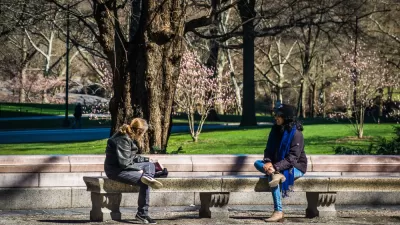People naturally want to be near each other, which some suggest is one explanation for the increasing urbanization and densification of the world. Edward L. Glaeser argues that the information-based economy will push that trend even further.
"Understanding the appeal of proximity - the economic advantages of agglomeration - helps make sense of the past and future of cities. If people still clustered together primarily to reduce the costs of moving manufactured goods, then cities would become increasingly irrelevant as transportation costs continue to decline.
If cities serve, as I believe, primarily, to connect people and enable them to learn from one another, than an increasingly information-intensive economy will only make urban density more valuable."
He cites a study that shows economic productivity increasing with metropolitan density, and looks at some of the reasons why.
FULL STORY: Why Humanity Loves, and Needs, Cities

Planetizen Federal Action Tracker
A weekly monitor of how Trump’s orders and actions are impacting planners and planning in America.

Chicago’s Ghost Rails
Just beneath the surface of the modern city lie the remnants of its expansive early 20th-century streetcar system.

San Antonio and Austin are Fusing Into one Massive Megaregion
The region spanning the two central Texas cities is growing fast, posing challenges for local infrastructure and water supplies.

Since Zion's Shuttles Went Electric “The Smog is Gone”
Visitors to Zion National Park can enjoy the canyon via the nation’s first fully electric park shuttle system.

Trump Distributing DOT Safety Funds at 1/10 Rate of Biden
Funds for Safe Streets and other transportation safety and equity programs are being held up by administrative reviews and conflicts with the Trump administration’s priorities.

German Cities Subsidize Taxis for Women Amid Wave of Violence
Free or low-cost taxi rides can help women navigate cities more safely, but critics say the programs don't address the root causes of violence against women.
Urban Design for Planners 1: Software Tools
This six-course series explores essential urban design concepts using open source software and equips planners with the tools they need to participate fully in the urban design process.
Planning for Universal Design
Learn the tools for implementing Universal Design in planning regulations.
planning NEXT
Appalachian Highlands Housing Partners
Mpact (founded as Rail~Volution)
City of Camden Redevelopment Agency
City of Astoria
City of Portland
City of Laramie





























